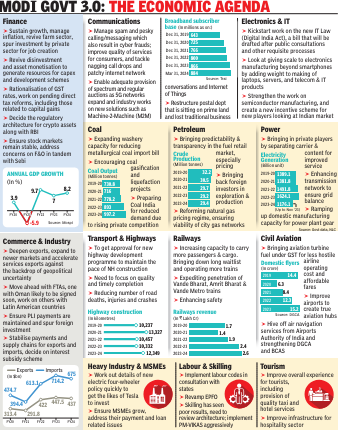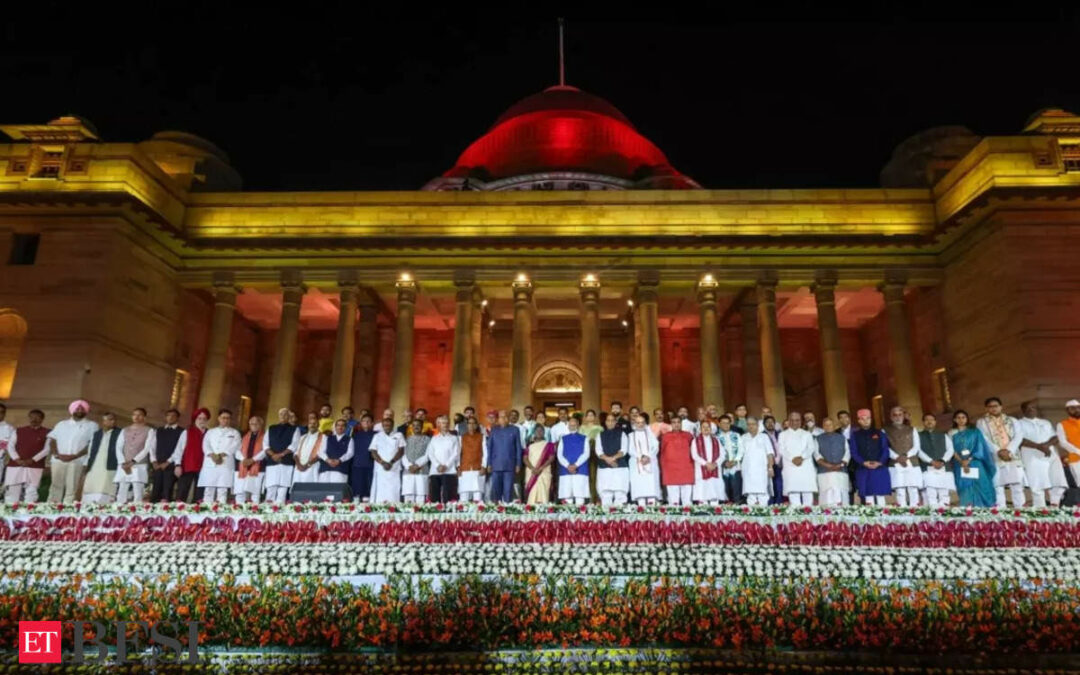New Delhi: With the swearing-in of Narendra Modi’s council of ministers over, the question uppermost on everyone’s mind is who will be the next finance minister. Will Nirmala Sitharaman stay in the wood-paneled office on the first floor of North Block, which is home to the finance ministry, or will she move to another ministry on Raisina Hill.
The task before the new FM is tough against the backdrop of a challenging geopolitical landscape. Sustaining growth, ensuring price stability and creating jobs by getting the private sector to invest are immediate priorities. Then there is the mammoth task of energy transition for Asia’s third largest economy that stares the new administration as climate challenges mount.
The theme of sustaining growth and getting private investment going again is expected to run through the Budget that is likely to be presented next month as well as the 100-days agenda of the new govt and Modi’s third term as PM.
While India remains on course to grow at over 7%, inflation has moderated although RBI governor Shaktikanta Das has cautioned that lowering it to 4% will not be so easy. Weatherproofing the farm sector against heatwaves and other weather shocks is a priority to keep the supply chain steady.
The key focus is going to be investment, especially by the private sector. Following the interim Budget, Sitharaman had suggested that investment should not be measured in the traditional sectors alone but also in newer areas such as global capability centres, space and artificial intelligence. But economists and industry players still believe that there is no alternative to creating jobs in factories and manufacturing plants, especially at a time when the lack of adequate employment seems to have emerged as a major issue in the general elections. That may require govt to offer some incentives, which Indian industry is never averse to.
Jobs and skilling are seen to be crucial, including in services such as tourism and hospitality. Govt will also need to address the issue of two-paced growth which economists and companies often talk about in the post-Covid period.
While govt has been focusing on areas such as production-linked incentives, the FM will need to ensure that the schemes see actual payouts and the private sector is not left chasing officials and the administrative ministries to get the promised funds.

Unlike the last two times, when BJP enjoyed absolute majority, this time the new FM will also have to be conscious of the political compulsions, which will include addressing demands of special category states from its two key allies as well as setting up the eighth pay commission to decide on salary revision for govt employees. Pay hikes for central govt staff are due in 2026, the year which will also see the implementation of the award of the 16th Finance Commission. Besides, there is the pending demand of assuring that the pension under NPS (new pension system) is at least half the last pay drawn. While Sitharaman had set up a committee headed by expenditure secretary T V Somanathan, the recommendations are yet to be submitted.
Some of the recommendations will also require the Centre to mobilise resources, while sticking to the fiscal glide path that it has charted for itself. That may mean govt will have to revive its asset monetisation and disinvestment drives, something that was suspended ahead of general elections, while ensuring that allies are on board.
Also on the agenda is the revamp of the seven-year-old GST regime which has multiple slabs, often creating classification issues.











